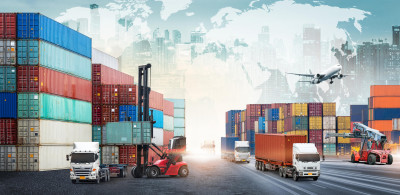In our last article, we learned that nothing should be left to chance in international trade. The global market is a challenge for companies. When our goods cross a border, it can become very complex to move them. Different countries have different laws! Being well prepared will help reduce the risk of late delivery and unforeseen expenses.
Before making a purchase abroad, you are responsible for evaluating the cost of your product and its admissibility to the country. We will soon address the various departments that determine standards and requirements for a wide variety of products, for example, Transport Canada for vehicles, Health Canada for pharmaceuticals and drugs, and the Canadian Food Inspection Agency for food products and wood packaging.
With respect to costs, you must first negotiate the purchase price and determine who will take responsibility for transportation, who will take the risk up to which point, and who will handle the customs formalities. It is important to understand that there are three steps in transportation. The first is pre-carriage from the seller's factory or warehouse to the airport of departure, port of departure or consolidation centre. The second is the main transport by air, sea, truck or train. Lastly, the third is post-carriage from the airport of arrival, port of arrival or deconsolidation centre to your premises. For clearing customs, there are two steps, the export declaration and the import declaration, which includes the payment of duties and taxes and the presentation of any permits or licences that may be required by Customs authorities. The seller and the buyer may assume all of these responsibilities or share them. In another article on incoterms, we will see how each of these steps can affect the cost of your purchase. The sound use of incoterms will be very helpful to you. Moreover, there is no doubt that you will find the services of a customs broker and a freight forwarder beneficial.
Some time ago, the primary goal of customs was to collect revenues for the government. However, with the industrialization of countries and increased competition from world markets, other goals have been added:
- Protection of industries. This protection has been achieved through the addition of tariff and non-tariff barriers such as quotas, permits and various regulations, and through the application of Canada’s trade policies, including the collection of duties and trade data. Canada’s intention is to increase the competitiveness of Canadian industries in global markets by introducing legislation to reduce or eliminate tariffs.
- Border protection. Customs must enforce the many laws that govern the arrival of goods and travellers and, where applicable, ensure that the requirements of other governments are met with respect to the importation of certain goods. These measures are meant to protect the environment, health and safety of Canadians.
Rates may go down or disappear, but the commitment to protect national interests remains. This is often seen in trade disputes between member countries of the World Trade Organization over agriculture or the difficulties faced between Canada and the United States in the interpretation of some of the free-trade agreement terms. Removing non-tariff barriers seems more difficult than removing tariffs.
Although the collection of duties has become a secondary function, this aspect of customs remains very important. We have to remember that Customs is a government department that continues to enforce the law and impose the applicable sanctions and penalties. Errors or omissions can be very costly!
In summary, the presence of Customs at the border helps to:
- Control the illegal entry of goods into Canada
- Prohibit the entry of goods that may endanger our health, environment or agriculture, and
- Improve our competitiveness by managing trade agreements and import and export policies
The importer must know and assume certain responsibilities in order to remain compliant with the various requirements of Customs. At a glance, these requirements may appear numerous and difficult to meet, but many of them are generally addressed in the company’s internal procedures, such as inventory control, accounting and record-keeping.
For transactions directly linked to Customs, the broker must act in a professional manner and perform services in accordance with requirements on behalf of the importer. In order to run smooth and effective customs operations, there must be close cooperation between the two parties.
Here are some examples of the importer's responsibilities toward Customs:
- Declare accurate information at the time of importation in documents, including details on the goods imported
- Obtain permits or licences for controlled goods
- Produce a voluntary declaration of goods that were involuntarily omitted at the time of importation
- Make payment of duties and taxes
- Correct customs transactions within the required timeframe when necessary
- Retain documents for a period of six years after the date of importation, including documents used to corroborate information on the value, origin and customs classification of imported goods
- Supply necessary details to determine the appropriate tariff classification, value and origin of goods
- Inform the broker of any change in the company’s activities that could result in the reduction or elimination of duties
- Give reasonable advance notice in the event of urgent shipments
There is no law preventing an importer from carrying out its own customs brokerage, but the practice is becoming increasingly difficult for the following reasons:
- Customs procedures are complex and constantly evolving, making it difficult and unprofitable for the importer to develop and maintain the required expertise in-house.
- The broker is able to clear goods through Customs quickly, prepare transactions properly and pay duties and taxes in a timely manner.
- The closure of several Customs offices and the introduction of new electronic clearance methods are making it more difficult for some importers.
- Prepare import and export documents upon request
- Obtain permits or licences
- Obtain release of goods
- Ensure local delivery of goods
- Prepare customs declarations for payment of duties and taxes (B3 and CF7501)
- Prepare claims (B2 and Drawbacks)
- Provide consulting services
Much like the importer has responsibilities toward Customs and the broker, the customs broker also has responsibilities toward Customs and the importer. Here are a few examples:
- Provide professional services in compliance with Customs laws and regulations
- Respect the confidentiality of client information and documentation
- Take all necessary steps to provide services in accordance with the client’s wishes
- Provide the client with a copy of all documents prepared on his or her behalf
When reading all this information, it becomes increasingly clear that international trade requires a great deal of preparation and the participation of numerous stakeholders in the field. Do not hesitate to contact us – we will be pleased to help guide you through the import jungle.

